Seeing ourselves with kinder eyes
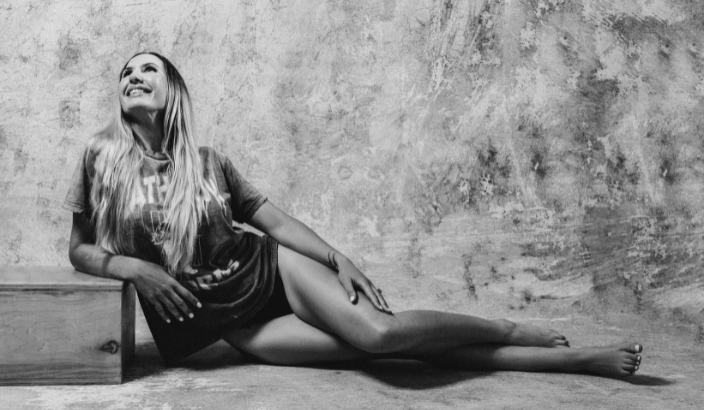
Lou Main. Photo by Victoria Vincent as part of her <em>This is Me – You as Fine Art </em>exhibition.
Letting our guard down and allowing ourselves to be seen as we are can often be a daunting thought. Many of us carry insecurities and inherited ideas about beauty that shape how we, often harshly, see ourselves. But breaking through that weight, whether it comes from past trauma or years of quiet self-doubt, can be liberating, empowering and incredibly healing. It can also be the first step on the journey toward self-acceptance.
Local photographer Victoria Vincent is tapping into that very transformation through a passion project that’s been years in the making. When you first meet Victoria it’s easy to see why people feel so comfortable in front of her camera. She’s warm, down-to-earth, and instantly puts you at ease, qualities that shine through in her upcoming exhibition This is Me – You As Fine Art, a celebration of self-expression, vulnerability, and the magic that happens when people show up just as they are.
On the following pages, Nelson Magazine shares reflections from some of these women, each of whom stepped into the studio with their own stories, insecurities, and hopes. We asked them about beauty, confidence, self-image, and what it meant to truly be seen. Their answers are raw, surprising, and deeply moving, and they challenge us to see beauty in a way that is honest, human, and completely unfiltered.
Together, their words and images remind us that self-acceptance isn’t about perfection, it’s about presence, permission, and seeing ourselves with kinder eyes.
The idea for the project was sparked back in 2019, shortly after Victoria moved from Wellington to Nelson. Having spent years photographing weddings and boudoir sessions, she noticed a shift in the kinds of clients reaching out, ones who weren’t preparing presents for partners.
“There were women who just thought, ‘stuff it, I want to do something for me’,” says Victoria.
Hearing their stories, she recognised the silent weight that many carry and how powerful a photograph can be in changing that narrative.
“For some reason we carry that shit around with us. We don’t see ourselves as others see us.”
No matter the style of photoshoot, Victoria’s approach stays the same: no pressure, no judgement, just real moments, real smiles.
“Every session is relaxed and organic, with no intended outcome.” she says. “It’s about creating space where people can feel safe and let their guard down. For me, capturing that genuine smile and genuine laugh, is the ultimate expression of beauty. My job is to catch them unaware, being truly themselves. They need to trust in the process, and trust in their own body and movement.” For Victoria, it’s been a journey of growth, too. “This project has empowered me just as much. I realised I had to back myself the same way I’ve been encouraging them to. It is because of these women that the exhibition is happening.”
The exhibition features portraits of local women, many of whom had never done anything like this before. For some, it’s been emotional, and even healing.
“The response has been amazing. Photography is a magical potion, some of these women have had huge shifts in how they see themselves. I’ve seen it happen time and time again, it’s pretty special.”
The exhibition may have been sparked by Victoria’s vision, but she says it’s the women in front of her lens who bring it to life.
This is Me – You as Fine Art exhibition
August 1 – August 30
Nelson City Framers
This is me: Angela Krammer
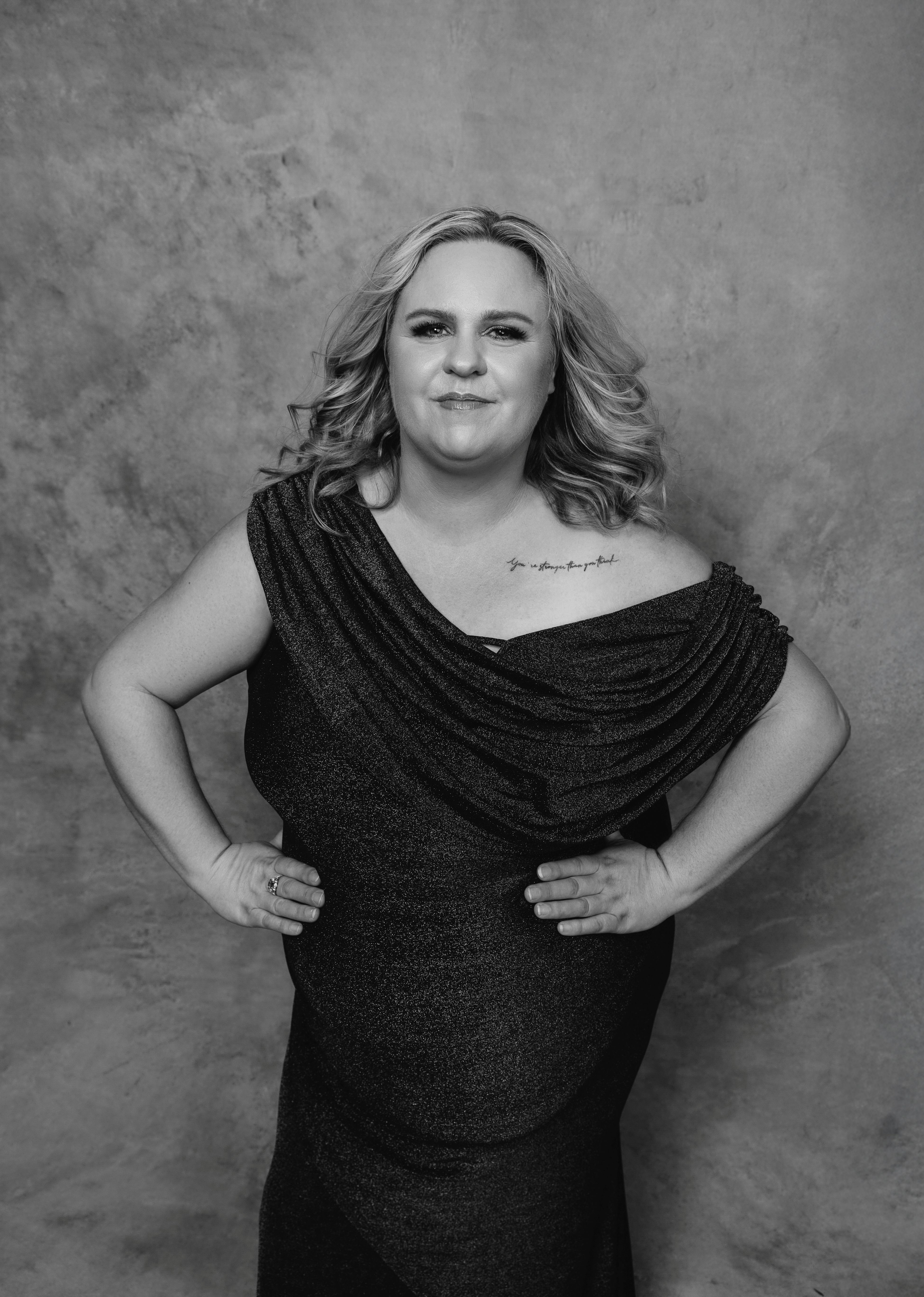
How would you have described your relationship with your own image – and has that changed since being photographed?
I have had a complicated relationship with my image over the years. Even when I was much smaller, I always thought I was overweight and needed a better body. We all have parts of our bodies we are not totally in love with too, so normally I’d fixate on those areas as soon as I looked at a photo, but with Victoria’s photographs, I didn’t do this at all. I am yet to pick a favourite, but I can tell you I didn’t dislike any of them.
What made you say yes to this experience – and to being seen in this way?
I have been in a major transformation stage in my life, so when Victoria offered for me to be included in her campaign I was honoured to be part of something so empowering and transformative. Surprisingly, I wasn’t concerned with how others see me, but the experience was for how I see myself.
When you first saw your portrait – what did you feel?
Is that really me? I was completely surprised and found myself smiling, genuinely smiling at my own images. Victoria creates the most incredible art, and for the first time in a long time I got to feel good about myself too.
Can you describe a moment in life when you felt truly powerful – or deeply proud of yourself?
As a child, I always wanted to be a dancer, but I never did anything about it. Five years ago, I stopped making excuses and started pole dancing – just for myself, for my fitness and for fun. The night I performed my first solo performance at a student showcase will always be a prominent moment in my life. I had never liked the idea of being on stage or being the centre of attention, but in that moment, it was so empowering, and I was so proud I had pushed myself out of my comfort zone. Every woman should try something that scares them and never stop chasing the things that make you feel alive.
How has your idea of beauty – in yourself or others – shifted over the years?
I don’t feel like my idea of beauty in others has changed much; I’ve always been so accepting of others, seeing the best in them. My idea of beauty in myself was always the challenge, but over the last few years I have learned to see past the imperfections and see the good in myself that I always credit in others. True beauty is something you feel, not see.
What does self-confidence mean to you now – compared to when you were younger?
Self-confidence is realising how incredible you truly are without needing someone else to tell you that you are. When I was younger, I thought self-confidence was about being less shy and more outgoing. I’ve come to realise it’s much deeper than actions, but a strong, positive relationship with myself has been a huge turn around for me.
How do you think society sees women as they age – and how would you like that to change?
We have seen this change drastically over the years, and I do hope it continues to change for the positive. Society used to disregard women who didn’t fit the expectation of beauty, but now we’re seeing ladies of all ages, sizes and races, all doing life the way they want to. I think women are stepping into their own power as they age, making them the most beautiful sight imaginable.
If you could speak to your younger self – what would you say about beauty, confidence, or worth?
Your worth isn’t defined by anyone else, nor in anyone’s opinions on your beauty. Put the energy you’re spending on others into yourself, because that’s when you’ll truly shine.
Why do you think it matters for women to take up space – to be visible, unapologetically?
Women have worked so hard over the years to be considered equals. We have these ideals placed before us to live up to – by others but also by ourselves. Taking the time to be visible and in our own space doesn’t just allow us to grow into the women we’re supposed to be, but we’re also setting examples for the next generations to come. As for being unapologetic, if you’re staying true to your values and aspirations, then no one should need to apologise for that.
What do you hope people feel – or understand – when they see your portrait in this exhibition?
I hope they feel inspired. Inspired to challenge themselves, to push past those voices in their head that say they can’t or shouldn’t do something. I hope they understand that once you make it past the fear, something great truly happens.
This is me: Lou Main
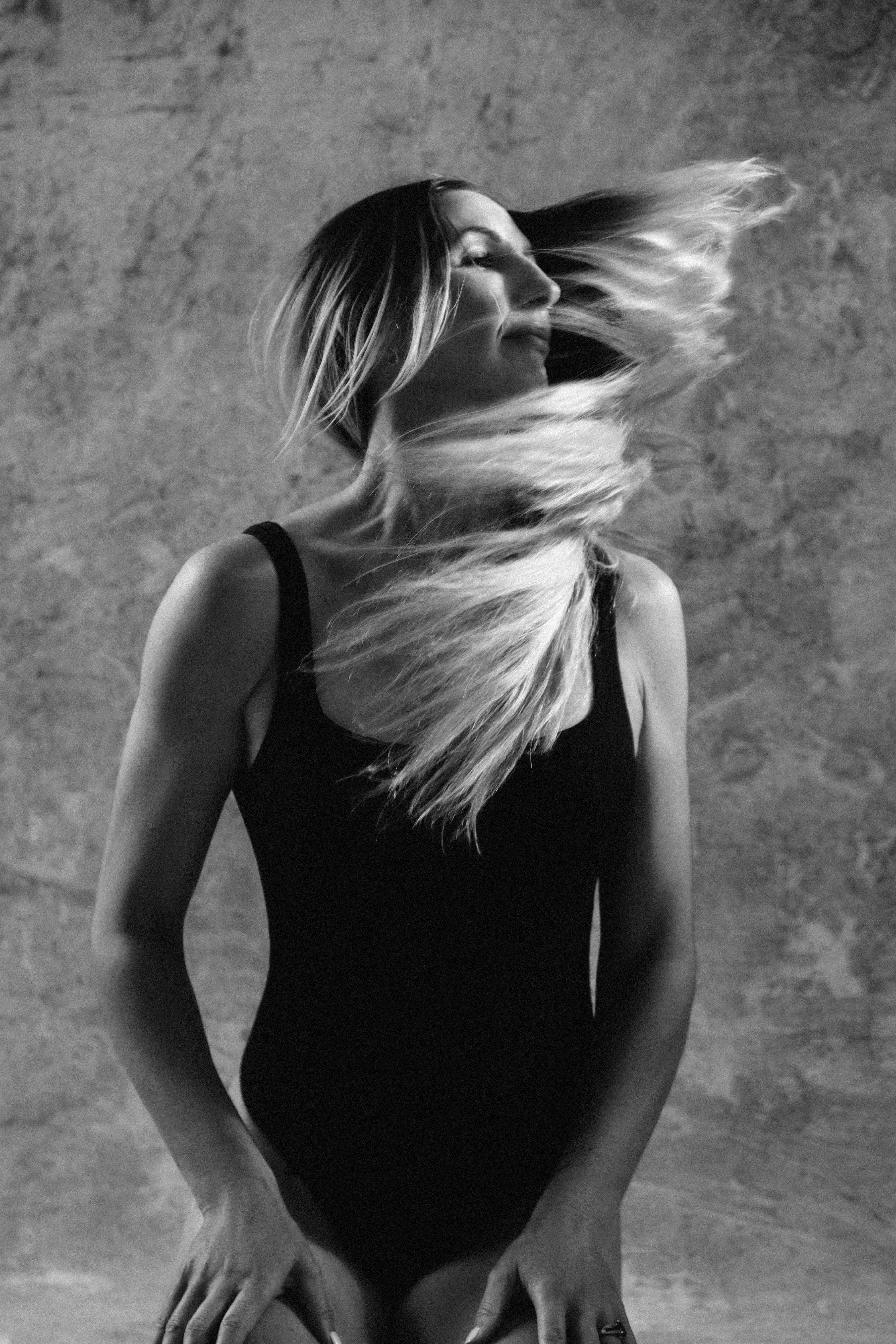
How would you have described your relationship with your own image – and has that changed since being photographed?
I’ve never had great confidence in the way I looked or felt comfortable being photographed. I’ve always had this highly critical voice in my head who picked away at things I didn’t like about myself. At some points in my life my self confidence was so low that I couldn’t stand looking in mirrors and looking back I felt really sad about that. As a mum I knew I really needed to heal that part of me because I don’t want to pass that on to my children, I mean, I would never be so critical of someone else’s appearance and yet I was bullying myself regularly. I really needed to challenge the way I was seeing myself and to change my inner narrative – I needed to see myself though someone else’s eyes for a change, someone who didn’t really know me but who I could trust, someone could sit with me in it if it got a bit much. It was a really big process for me – probably deeper than anyone imagines but it has helped me a lot.
When you first saw your portrait – what did you feel?
Shook! And then happy and then sad. I cried, and Victoria and my partner held my hands, and they had tears in their eyes too. I felt really sad, I’d treated myself so badly over the years. And then I was like wow – and said, “I can’t believe I can look like that!” to which they both exclaimed “You DO look like that! You literally look like that – it’s you!” it was funny, it was such a beautiful moment actually.
How has your idea of beauty – in yourself or others – shifted over the years?
It’s funny because even though I have all these hang-ups, I think women are so unbelievably beautiful in different ways. I love the quirky differences everyone has, and I do actually think that beauty comes from the inside. And that the exterior is generally the least interesting part about them. I don’t know why I don’t apply the same rules to myself. I’m curious about that.
What does self-confidence mean to you now – compared to when you were younger?
When I was younger, self confidence in the way I looked was deeply attached to value. I haven’t felt like that in a long time thankfully, my value is in who I am and what I do in the world. Self-confidence is more attached to the belief I have within myself that I have the ability to navigate whatever comes my way – thankfully it gets less about appearance as I get older.
Can you describe a moment in life when you felt truly powerful – or deeply proud of yourself?
Powerful? Well, I just leg pressed 180 kilograms at the gym this morning so that felt pretty powerful! Proud? Motherhood. I have two boys who are 9 and 13, and they have taught me more about myself than any other experience. I feel really proud of the mother I am for them, I work hard to be the mum they deserve. It’s my biggest and most important achievement.
How do you think society sees women as they age – and how would you like that to change?
I think it sees women as decreasingly important as they age. That women just get older and weaker and matter less. I think a lot of women think that too, I think they feel it in their bodies and live it out, and that bothers me. I love to challenge that narrative, I turn 43 soon so I’m still pretty young but I refuse to slow down or submit physically to the social norms of aging in a boring way. I’m not shrinking away, if anything I’m getting louder, bigger and so much stronger – I’m not limiting myself to someone else’s idea of what this part of life looks like. There’s no age limit on growth, I want to get hotter, stronger, weirder, smarter, wiser, more interesting and more interested – more myself, more curious, more loving, more open – give me everything life has got to give, all the wins, the hard stuff, all the lessons, Bring it. I want it all.
If you could speak to your younger self – what would you say about beauty, confidence, or worth?
Babe, you are so beautiful inside and out – trust people when they tell you that. And also stop being so mean to yourself, it’s a dirty habit, cut it out!
What do you hope people feel – or understand – when they see your portrait in this exhibition?
I want them to know this. You are not beholden to your self-limiting beliefs. Slay your dragons.
This is me: Michele Surcouf
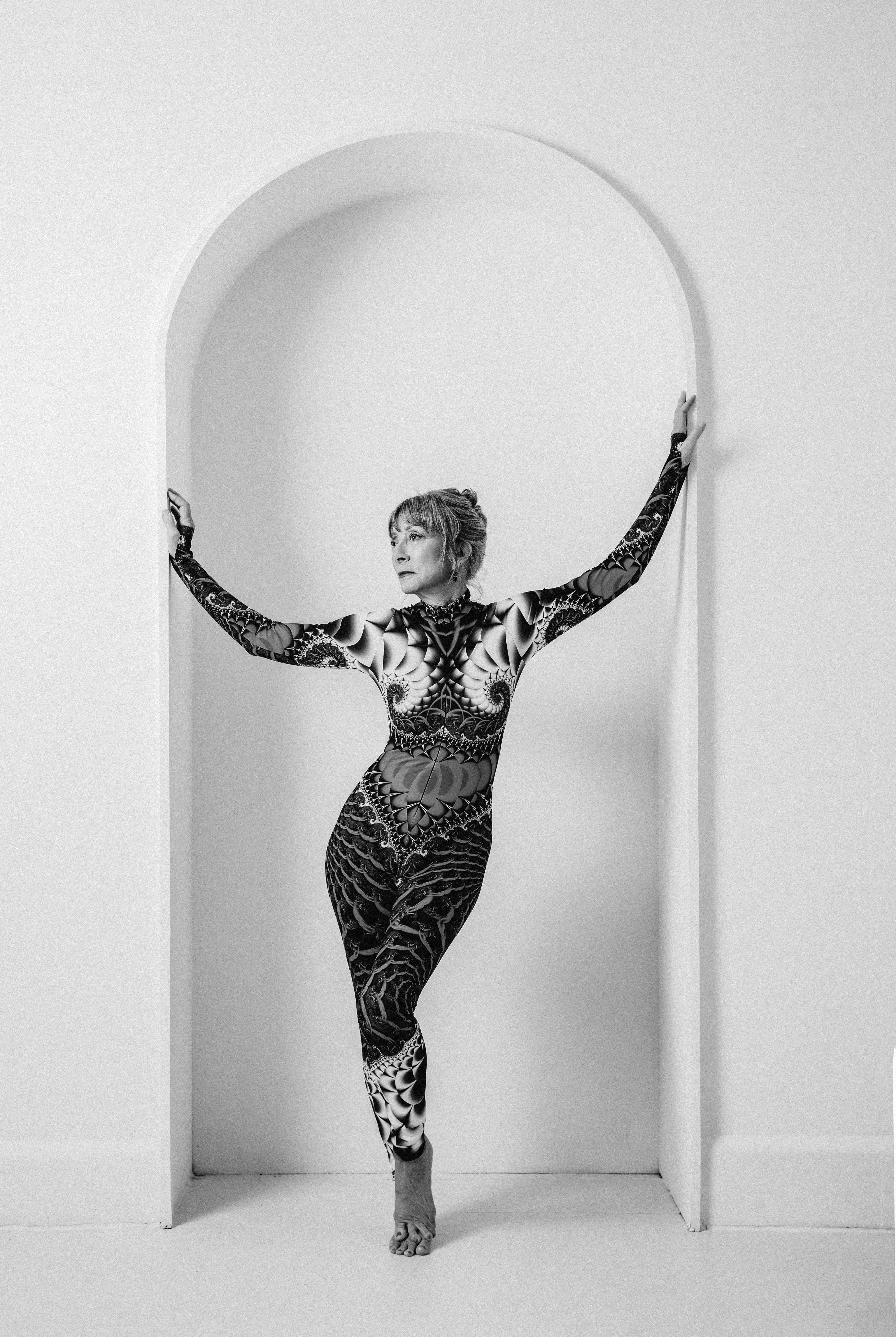
How would you have described your relationship with your own image – and has that changed since being photographed?
I’ve always felt a bit outside the conventional mould of beauty. As a younger woman, I didn’t feel confident or particularly attractive – I just felt different. I’ve always been sporty, so I’ve collected a lot of injuries. Oddly, I never minded my scars; they told a story, they felt earned. But wrinkles? That’s been harder. They expose the slow erasure of youth, and I’ve resisted what they represent – not just aging, but invisibility. This photoshoot helped shift that. I saw myself not just as aging, but as alive – fully present, strong, and still becoming.
What made you say yes to this experience – and to being seen in this way?
A mix of curiosity and defiance, I think. I wanted to confront the discomfort I’ve had with aging and appearance – to see what would happen if I stopped worrying about it and just stood there. To be seen, honestly and without shame, felt like an empowering act.
When you first saw your portrait – what did you feel?
I felt excitement, actually. As an artist, I’ve always appreciated the human form. And when I looked at the photos from an artist’s perspective, trying to see them without judgment, I saw something beautiful. Not the kind of beauty I spent years chasing, but something quieter and more profound. There I was – not hiding, not performing, just being. It revealed a strength and stillness that surprised me. It felt like being seen fully – wrinkles, scars, soul and all.
How has your idea of beauty – in yourself or others – shifted over the years?
I’ve learned that the standard of beauty constantly changes, and chasing the latest beauty fads is like trying to catch the wind. Celebrity culture has always rewarded youth and beauty, but as I’ve matured, I’ve realised it’s really about presence. Confidence. Depth. Truth. Beauty is the way someone carries their experience, owning their stories, their imperfections – all of it. Beauty lives in authenticity.
What does self-confidence mean to you now – compared to when you were younger?
As a younger woman, I didn’t have much confidence. I felt unsure of how I presented and was hesitant to be my true self – for fear of not being enough, particularly, not pretty enough. Now, confidence feels like quiet certainty – not only in how I look, but in who I am. I no longer care about how others see me; it’s about seeing myself clearly.
Can you describe a moment in life when you felt truly powerful – or deeply proud of yourself?
I have had many adventures in my life, but other than living through some of the more extreme adventures, I can’t say I felt ‘proud’ of them. Perhaps when I’ve been immersed in the flow of sport or art, I’ve felt most authentic. But ironically, those are moments where ‘self’ disappears altogether. So I’d have to say, this photo experience was unexpectedly powerful. To stand in front of a lens, unclothed and unguarded, is a brave thing to do. I’ve come away feeling proud not just of the photographs, but of the fact that I’m allowing myself to be seen.
How do you think society sees women as they age – and how would you like that to change?
We (aging women) are often viewed through a lens of loss – as though aging means fading away. But there’s so much richness in these years, so much intelligence and sensuality and humour. I’d love for society to stop pretending we disappear after 50. We don’t.
If you could speak to your younger self – what would you say about beauty, confidence, or worth?
I look back at old photos and wonder why I was so insecure! Now, I can see the beauty I didn’t see then. I’m sure those who loved me told me I was lovable and beautiful, but I wasn’t ready to hear it. If I did have the chance to speak to my younger self, I’d say, “One day you’ll realise that the things you felt made you ‘different’ or unattractive were actually the most beautiful parts of you.”
Why do you think it matters for women to take up space – to be visible, unapologetically?
Because invisibility is not a natural part of aging – it’s something imposed upon us by our culture. And the only way to break that pattern is to refuse to vanish. When we take up space, we’re not just seen – we give others permission to do the same.
What do you hope people feel – or understand – when they see your portrait in this exhibition?
I hope they see a woman who resisted parts of aging, who still does, but who is learning to honour herself anyway. I hope they feel a sense of recognition – that beauty is not just youth-dependent, and that it’s never too late to change how you see yourself.
This is me: Marie Austin
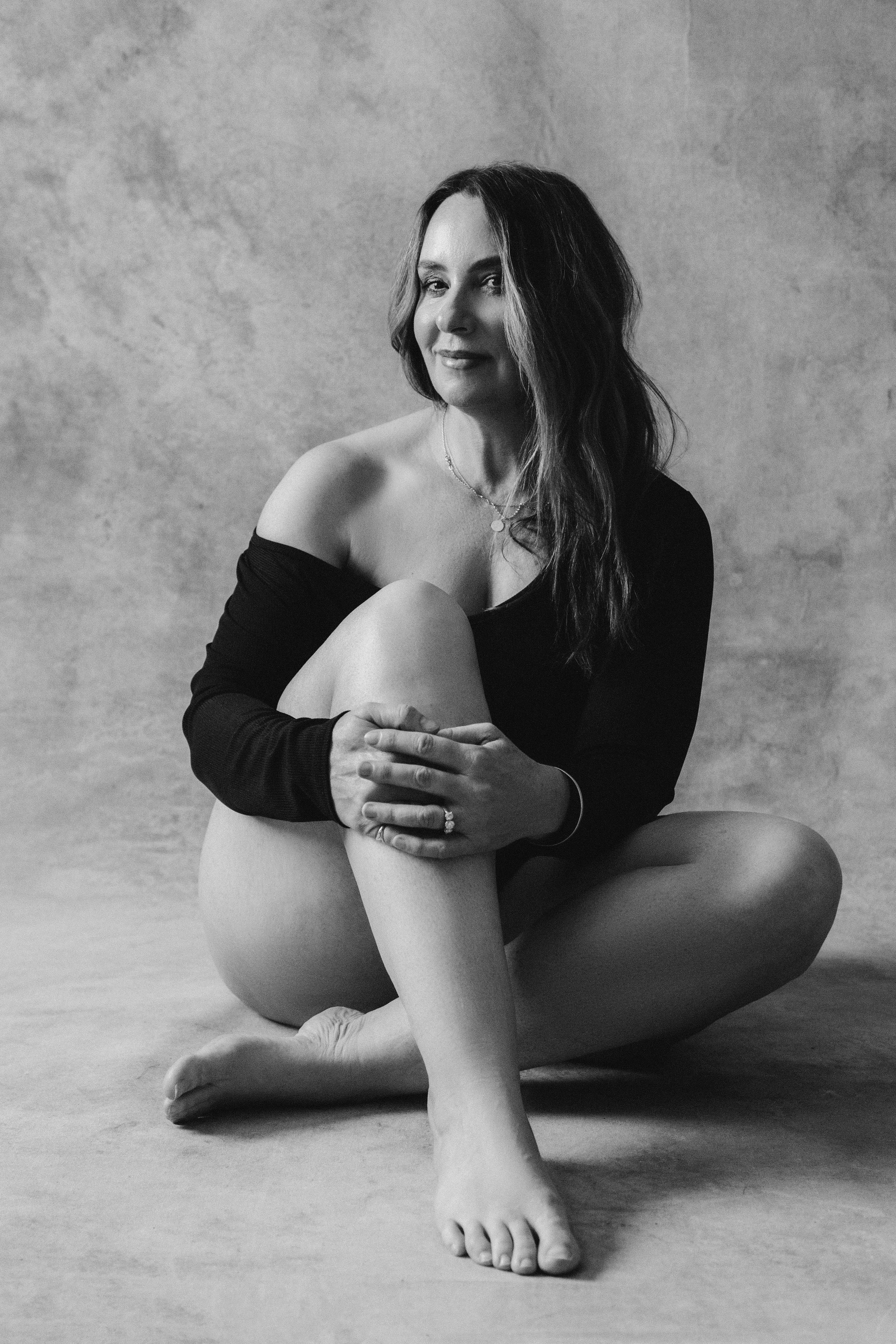
How would you have described your relationship with your own image – and has that changed since being photographed?
In the past, I had a complicated relationship with my own image/body. I often saw myself through a lens of insecurity or comparison – focusing more on how I didn’t measure up and my “flaws” – bits I wanted to change to certain ideals, rather than appreciating what made me unique. So yes, the act of being photographed like this has definitely started a change in how I relate to my image – it's helped me start to accept and even value it in a new way.
What made you say yes to this experience – and to being seen in this way?
I was tired of only seeing my body through a filter of imperfections, comparison, and a persistent feeling of inadequacy. It was draining as a 45-year-old to always
judge myself by standards that felt impossible to meet. I wanted to honour it instead – for everything it’s carried, survived, and become. Saying yes to this photo felt like reclaiming my body from all the years I tried to disconnect from it and undervalue it.
Saying yes felt like reclaiming something I’d spent years giving away: permission to take up space as I am. This experience was less about being looked at, and more about allowing myself to be truly seen.
When you first saw your portrait – what did you feel?
At first, I couldn’t help but notice every flaw – the imperfections I’d always fixated on. It wasn’t easy to look past those moments of discomfort. But alongside that, there was also pride beginning to grow. For the first time, I felt truly seen – not just my flaws, but all of me. And that unexpected recognition gave me permission to be a little kinder to myself. That moment has stayed with me, and I know it will continue to do so.
What does self-confidence mean to you now – compared to when you were younger?
When I was younger, I thought confidence in your body meant loving everything about it all the time – being proud to show it off, never feeling insecure, always feeling ‘put together.’ And because I didn’t feel that way, I assumed I wasn’t confident, or I would just fake it. I thought I had to fix, shrink, or hide parts of myself before I could earn that feeling.
Now, confidence means something completely different. It means showing up in my body as it is, even when I don’t love every part of it. It’s wearing the outfit I like, even if I’m self-conscious about how my stomach looks. It’s not letting the voice in my head that says “cover that” or “you’re not enough” be the loudest one.
How do you think society sees women as they age – and how would you like that to change?
I think society views aging women harshly – like they’re becoming less visible, less valuable, or less worthy of admiration and respect. There’s this constant pressure to hold onto youth, to erase wrinkles, to hide the natural changes that come with time. It’s like aging is seen as a problem to fix rather than a natural, powerful part of life.
Ultimately, I want women to feel free to age on their own terms, without judgment or shame – whether they embrace every wrinkle or choose to soften them. True beauty comes from confidence and selfacceptance, not just from looking young.
If you could speak to your younger self – what would you say about beauty, confidence, or worth?
I would tell her that beauty is so much bigger than what she sees in the mirror. It’s not about fitting into a mould or chasing perfection. I’d remind her that confidence isn’t about never feeling unsure or comparing herself to others. It’s about choosing to stand tall and be herself anyway, even when she’s scared or feels small. Most importantly, I’d tell her that her worth isn’t tied to her looks, achievements, or anyone’s approval. I hope she’d hear me and start being a little kinder to herself, a little braver in her own skin, a little more patient with the journey.
Why do you think it matters for women to take up space – to be visible, unapologetically?
Because for so long, women have been taught to shrink – to make themselves smaller, quieter, less noticeable – to fit into a world that wasn’t built with them in mind. Taking up space unapologetically is a powerful act of resistance. It’s saying, “I am here. I matter. My voice, my body, my story deserve to be seen and heard.” When one woman stands tall and visible, it sends a message to the next that she can too. It breaks down invisible walls, opens doors, and reshapes a male-dominated culture.
What do you hope people feel – or understand – when they see your portrait in this exhibition?
I want them to see that every body has a story, full of strength, struggle, and beauty – even when it’s not immediately obvious. Maybe it will remind them that it’s okay to be imperfect – to be vulnerable. More than anything, I hope my portrait encourages others to embrace themselves fully, and to know that beauty and worth aren’t tied to a number, size or a shape.
